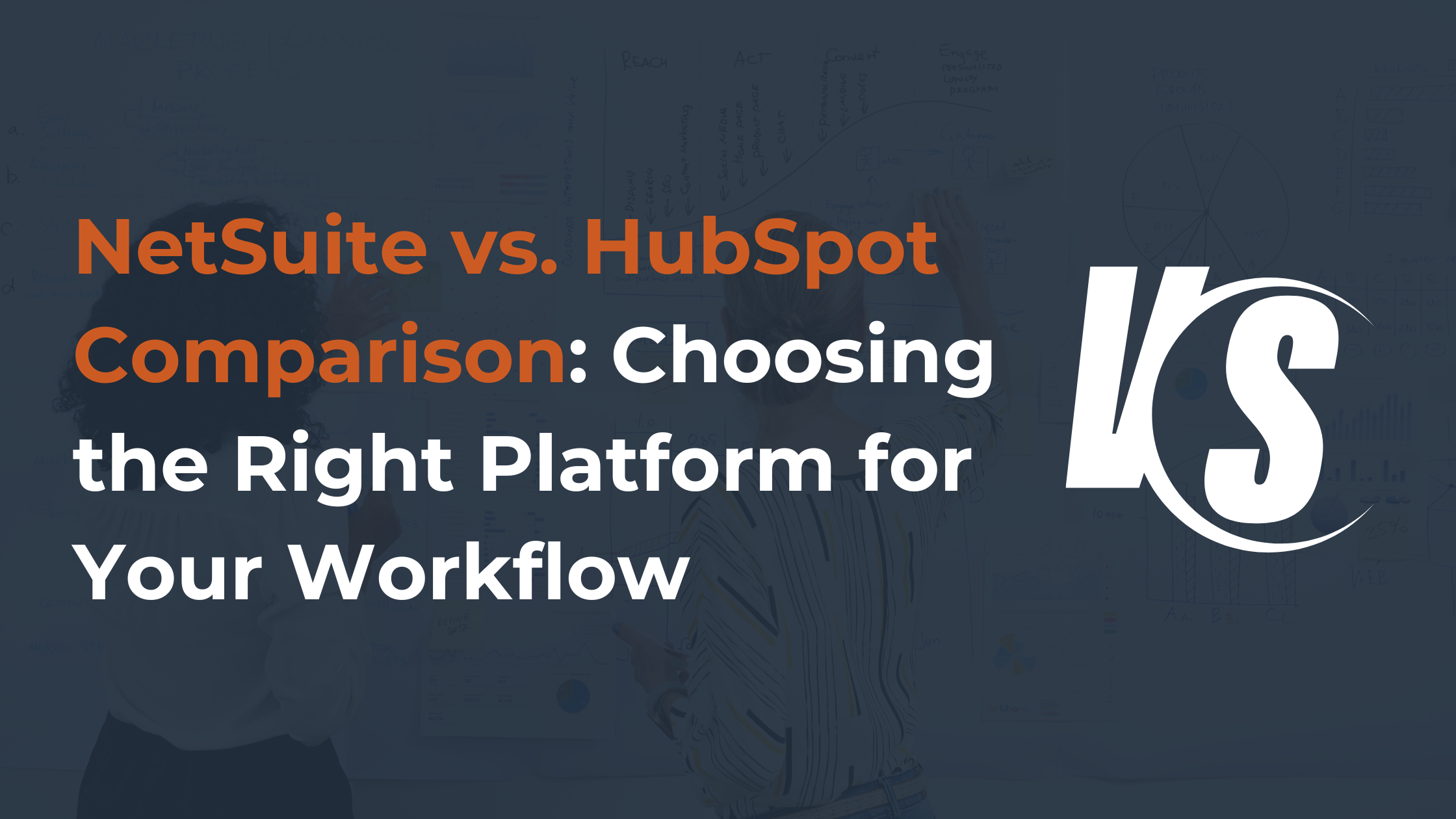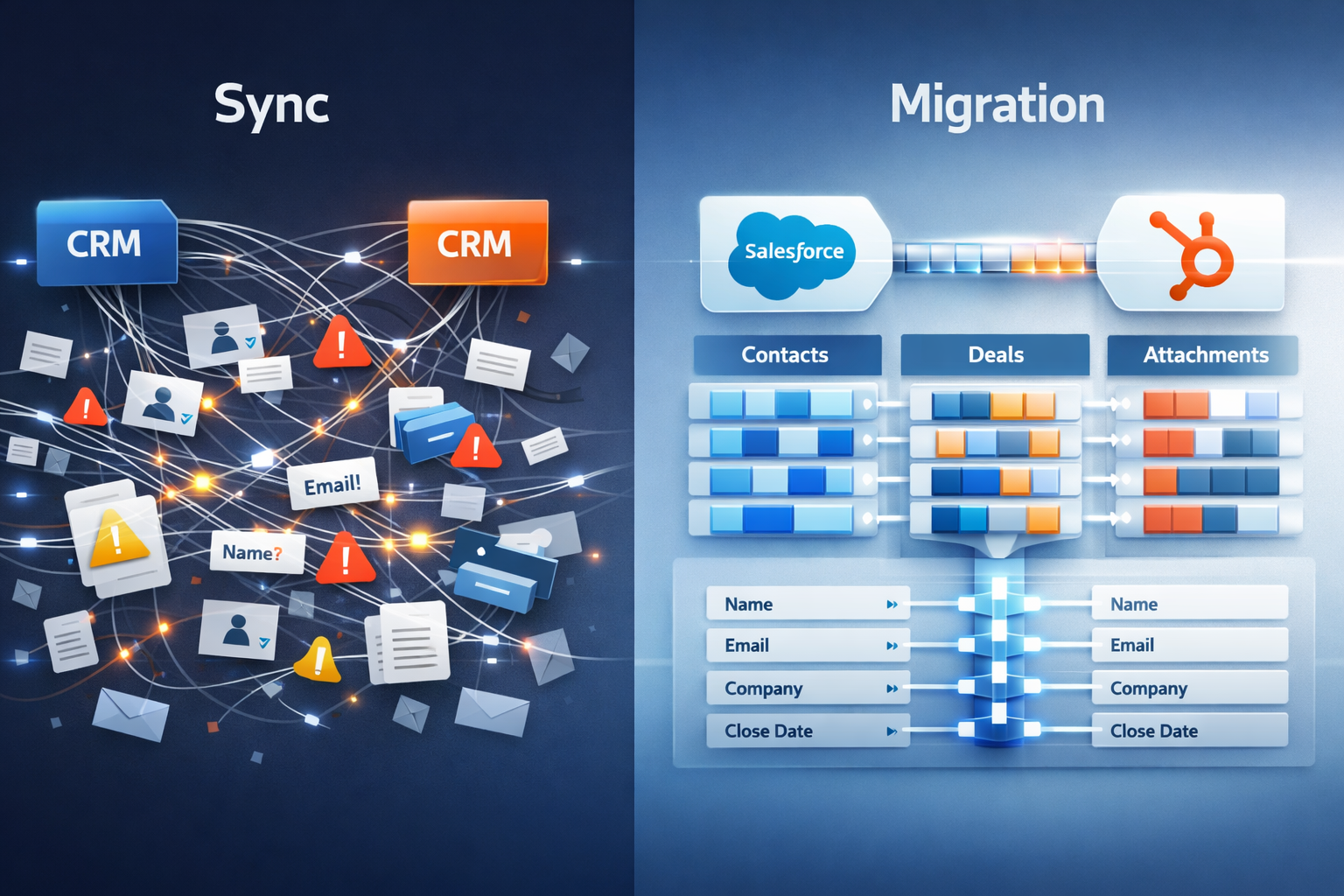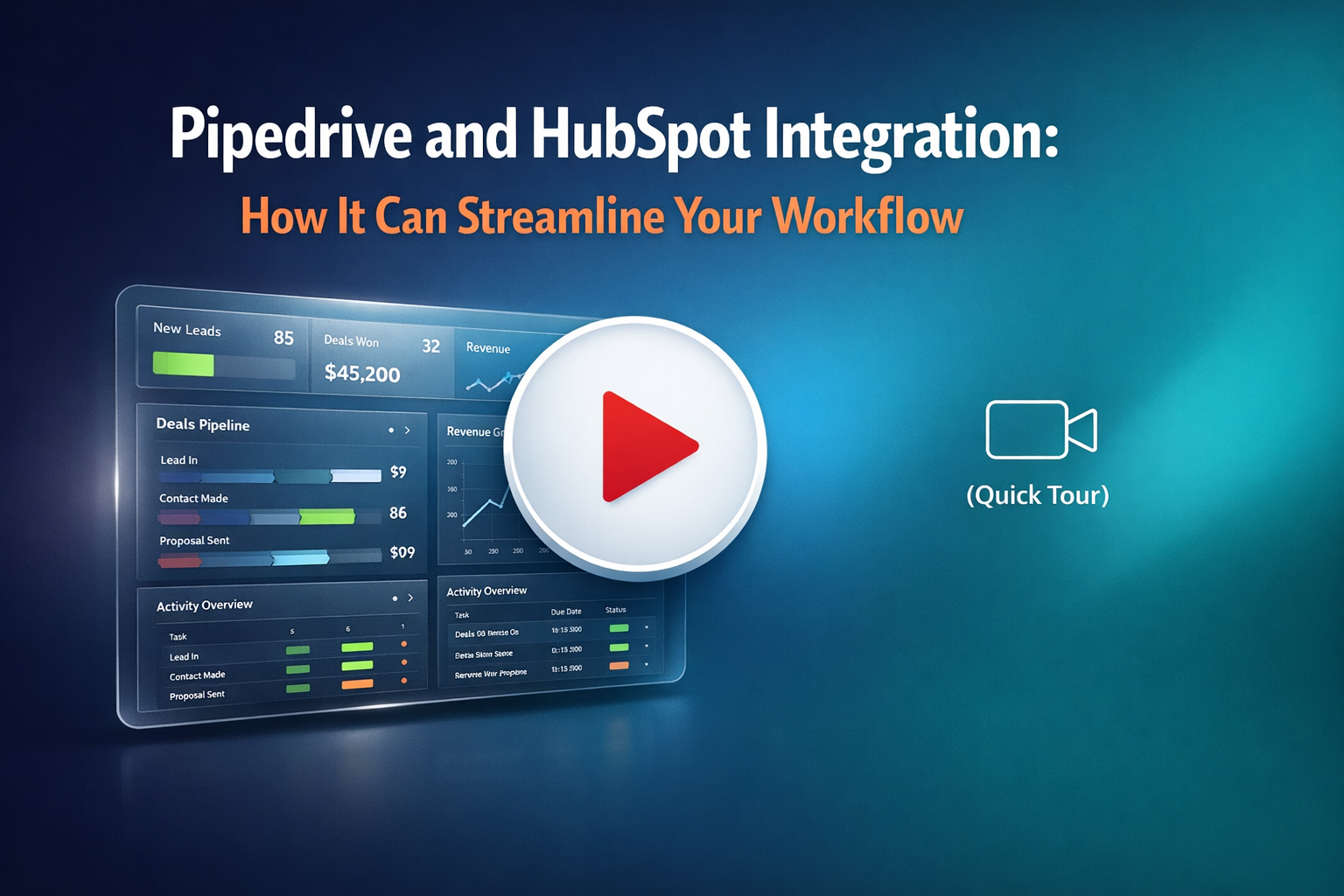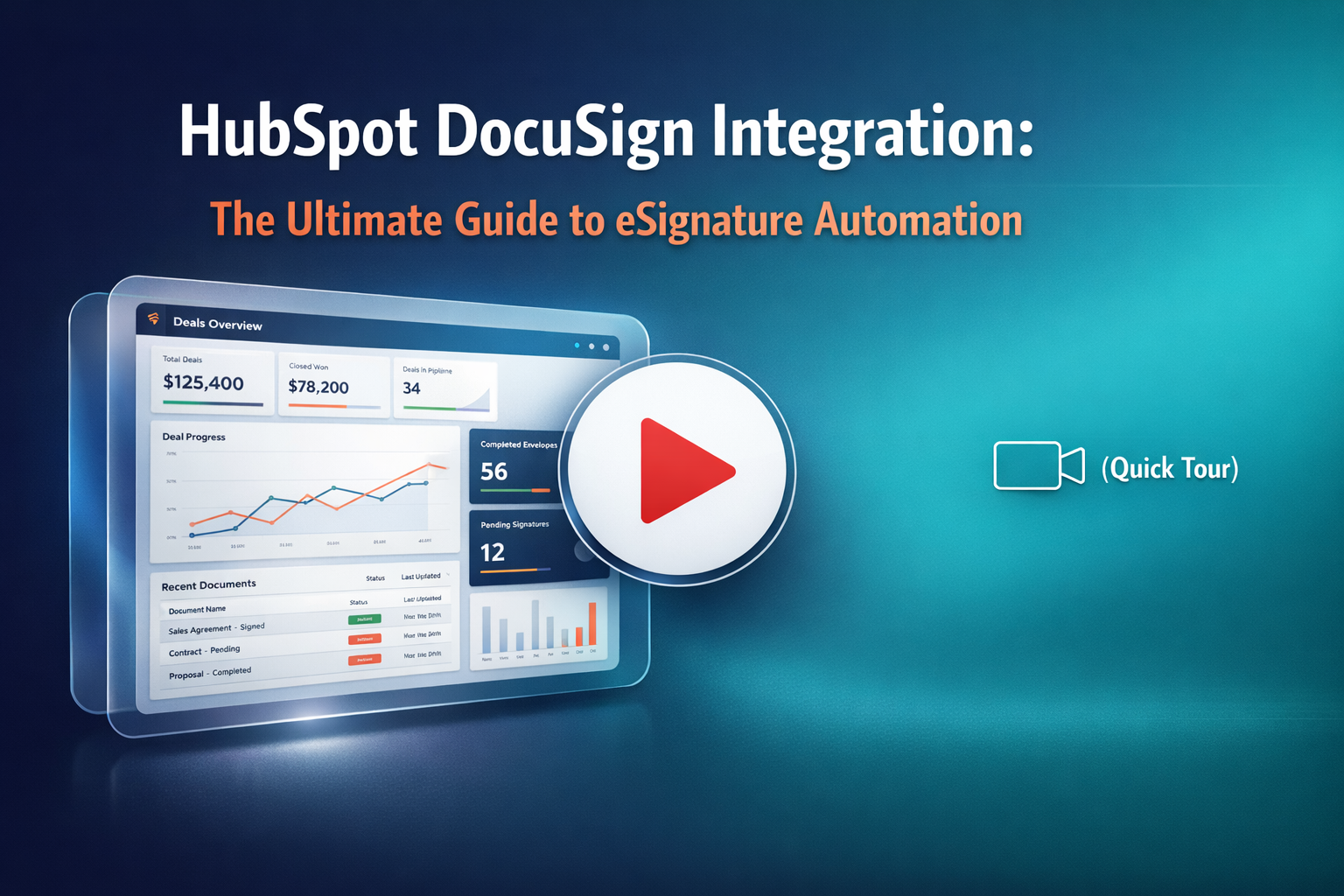Here, you can quickly read a short summary of the main benefits of each system. Continue reading the article to delve deeper into the NetSuite CRM vs HubSpot comparison.
NetSuite CRM Benefits:
- Scalable for large, complex enterprises, especially those already using NetSuite ERP.
- Integrated end-to-end system spanning sales, finance, inventory, and more.
- Robust analytics and enterprise-grade reporting.
- Advanced CRM features: quote-to-cash, commissions, and partner management.
- Global-ready with multi-entity and multinational support.
- Customizable and extensible through SuiteApp and APIs.
- Backed by Oracle’s enterprise-level support and training programs.
HubSpot CRM Benefits:
- Designed for ease of use and fast deployment.
- Strong fit for SMBs, startups, and mid-market companies.
- Free tier and transparent modular pricing make it budget-friendly.
- Market-leading marketing automation and inbound tools.
- User-friendly interface and mobile experience.
- The rich ecosystem of plug-and-play integrations.
- Highly rated customer support and free learning resources via HubSpot Academy.
- Strong reputation for usability and value in user reviews.
Table of Content
Overview of NetSuite CRM vs HubSpot CRM

Despite having distinct advantages, NetSuite CRM and HubSpot CRM frequently stand out when comparing customer relationship management (CRM) systems. As a component of the Oracle ecosystem, NetSuite provides a powerful, enterprise-level CRM that is closely integrated with finances and ERP systems. In contrast, HubSpot CRM is highly regarded for its robust inbound marketing features, scalability, and user-friendly design.
Before we dive into the NetSuite vs HubSpot comparison, here is a breakdown of what each platform offers.
What is NetSuite?
Oracle created NetSuite CRM, a cloud-based customer relationship management platform. It’s designed primarily for mid-sized to large enterprises seeking an all-in-one system that integrates CRM with Enterprise Resource Planning (ERP), e-commerce, and professional services automation.
NetSuite stands out for its depth and complexity, making it an ideal solution for companies that require a unified system for customer data, finance, inventory, and operations — all in one platform.
What is HubSpot?
HubSpot CRM is a cloud-based platform tailored for businesses of all sizes, with a particular focus on small to mid-sized companies. Known for its intuitive interface and free entry-level offering, HubSpot’s CRM excels in aligning marketing, sales, and customer service.
HubSpot’s modular approach, divided into Hubs for Marketing, Sales, Service, CMS, and Operations, allows businesses to scale functionality as they grow. It's an excellent choice for companies prioritizing inbound marketing, ease of use, and a fast time to value.
Key Differences Between NetSuite CRM and HubSpot

While both NetSuite CRM and HubSpot CRM are powerful platforms, they serve different types of businesses and excel in distinct areas. Here's a comparison of HubSpot vs NetSuite across critical categories.
|
Feature |
NetSuite CRM |
HubSpot CRM |
|
Enterprise-grade scalability |
✅ |
✅ |
|
SMB/startup friendly |
✅ |
|
|
Integrated back-office functionality |
✅ |
|
|
Front-office marketing & sales tools |
✅ |
|
|
Robust analytics and reporting |
✅ |
✅ |
|
User-friendly interface |
✅ |
|
|
Fast deployment and onboarding |
✅ |
|
|
Rich marketing automation tools |
✅ |
|
|
Native ERP integration |
✅ |
|
|
Plug-and-play 3rd-party integrations |
✅ |
|
|
Highly rated support and training |
✅ |
|
|
Free tier available |
✅ |
|
|
Transparent pricing |
✅ |
|
|
Strong mobile experience |
✅ |
|
|
Customizability via APIs/SuiteApp |
✅ |
✅ |
|
High user satisfaction rating (Capterra) |
✅ (4.2) |
✅ (4.5) |
Target Audience and Scalability
NetSuite CRM is tailored for mid-sized to enterprise-level organizations that need comprehensive control over their operations. It’s best suited for companies that are already using or planning to implement NetSuite’s ERP, e-commerce, or finance modules. It supports multinational operations, complex organizational structures, and advanced workflows, making it highly scalable but also resource-intensive.
HubSpot CRM, meanwhile, is ideal for small to mid-sized businesses, startups, and growing teams that want quick deployment, easy onboarding, and flexibility. With its free tier and modular pricing, HubSpot grows alongside your company. It’s also suitable for enterprises seeking a front-office solution that integrates with their existing systems.
Core Functionality
One of the main aspects of the NetSuite vs HubSpot comparison is their key functions. NetSuite CRM includes a full suite of tools: sales force automation, quote-to-cash processes, commissions management, and partner relationship management. These features are tightly integrated with back-office systems such as inventory, order management, and accounting, creating a seamless end-to-end flow of information.
HubSpot CRM focuses on front-office excellence. It provides lead and pipeline management, task automation, contact and deal tracking, and seamless handoff between sales, marketing, and service teams. While it doesn’t offer ERP-level features natively, it shines in helping teams attract, engage, and retain customers with minimal friction.
Marketing Automation
NetSuite CRM includes campaign management, email marketing, lead scoring, and ROI tracking. These tools are powerful but require configuration and may not be as intuitive as modern, marketing-first platforms.
HubSpot CRM was built around inbound marketing, and its Marketing Hub offers one of the most user-friendly and feature-rich automation platforms available. You get tools for SEO, content marketing, ad management, landing pages, email automation, and behavior-based workflows, even in lower tiers.
Integrations and Extensions
NetSuite CRM integrates natively with other NetSuite modules and Oracle solutions. Third-party integrations are available through SuiteApp but may involve additional licensing or development work. Custom API connections are also possible but require more technical resources.
When we review HubSpot integrations in our NetSuite vs HubSpot CRM comparison, HubSpot CRM boasts a vibrant ecosystem of over 1,000 pre-built integrations covering a wide range of applications, from e-commerce and social media to finance and help desk tools. Most are plug-and-play, which makes HubSpot ideal for businesses that rely on a best-of-breed tech stack and want to avoid costly custom integrations.
Customer Support and Training
NetSuite CRM offers support primarily through Oracle’s Customer Support services, which are structured into several tiers. The level of service and responsiveness you receive depends heavily on the support plan you choose, ranging from Basic, Premium, to Advanced Customer Support (ACS).
Basic support typically includes access to a knowledge base, community forums, and ticket-based assistance during business hours. Premium and ACS plans offer 24/7 support, proactive monitoring, dedicated success managers, and faster resolution SLAs, but these come at a significant additional cost.
While Oracle University provides robust formal training, including webinars, courses, and certifications, many organizations still need to dedicate internal IT or admin resources to maintain and optimize the system over time.
HubSpot CRM, on the other hand, has built its reputation on accessible, responsive, and well-documented support, especially appealing to small and mid-sized businesses. The free plan includes self-service resources like HubSpot’s detailed knowledge base, community forums, and HubSpot Academy, which is widely regarded as one of the best free learning platforms in the SaaS space. Paid plans (Starter and above) unlock email and in-app chat support, while Professional and Enterprise tiers offer 24/7 phone support and a dedicated onboarding specialist.
HubSpot Academy offers free certifications in CRM use, inbound marketing, sales enablement, and more, making it easy for individuals and teams to learn the platform at their own pace.
Ease of Use
NetSuite CRM is feature-rich but can be intimidating for new users. It often requires admin support or training to fully utilize. Customizing dashboards, reports, and workflows may require technical skills.
HubSpot CRM is renowned for its ease of use, with a clean UI, drag-and-drop interfaces, and minimal setup. In our NetSuite vs HubSpot CRM comparison, it`s important to note that it’s one of the fastest CRMs to deploy and adopt, even for non-technical users.
Analytics and Reporting
NetSuite CRM offers robust, enterprise-level analytics. Real-time dashboards, role-based KPIs, and complex report building make it ideal for companies needing multi-layered operational insights tied to financial data.
HubSpot CRM provides visual dashboards and accessible reporting out of the box. While basic reporting is available in the free version, more advanced analytics and custom reports are unlocked in higher tiers. It’s best suited for marketing, sales, and service metrics.
Mobile Access
How do NetSuite and HubSpot compare in terms of mobile access? NetSuite CRM offers a mobile app that provides access to key CRM functionality. While useful, it’s not as fluid or visually appealing as some modern apps and may require more steps for everyday tasks.
HubSpot CRM’s mobile app is designed for on-the-go productivity. Users can easily log calls, send emails, track deals, and manage tasks in a clean, responsive interface — ideal for field sales and remote teams.
Pricing
NetSuite CRM operates on a custom-quote pricing model. Costs include licenses, user fees, implementation, support, and possible ERP modules, which can make total ownership expensive. It’s best suited for businesses with larger budgets and internal IT resources.
HubSpot CRM offers a free-forever plan with generous features and clear, tiered pricing for Sales, Marketing, and Service Hubs. Costs can rise quickly as you add users or advanced features, but the transparency and modularity make it easier to manage than NetSuite’s opaque pricing model.
HubSpot pricing varies from €15/ per seat per month to €3,300 per month for enterprise businesses.
User Reviews and Reputation
The last but essential aspect of HubSpot vs NetSuite comparison is user reviews. NetSuite CRM is respected in the enterprise space for its powerful capabilities and integration depth, but reviews often cite a steep learning curve, high implementation costs, and limited flexibility for smaller teams. The rating on Capterra is 4.2 out of 5, based on 1,755 reviews.
HubSpot CRM consistently earns high marks for usability, support, and fast time-to-value. It’s a favorite among sales and marketing teams, especially in SMBs and mid-market businesses, though larger enterprises are increasingly adopting it for front-office operations. The rating on Capterra is 4.5 out of 5, based on 4,392 reviews.
NetSuite CRM vs HubSpot: Which Suits Your Business Size?

HubSpot and NetSuite are designed for very different audiences. Let's look at target audiences in the NetSuite-HubSpot comparison.
HubSpot for Startups and SMEs
HubSpot CRM is an excellent option for new organizations, small businesses, and expanding mid-sized enterprises. Because of its lightweight, user-friendly, and simple setup, it's ideal for teams without a professional IT or CRM administrator.
Why it fits smaller businesses:
- Free tier available: Startups and early-stage companies can use the CRM at no cost, with access to essential tools like contact management, email tracking, deal pipelines, and reporting.
- Simple onboarding: Most teams can be up and running within a day or two. No coding or technical setup is required.
- Marketing-ready: With inbound marketing features built in, it’s ideal for businesses trying to attract and nurture leads without investing in separate tools.
- Affordable upgrades: As businesses grow, they can upgrade to paid Hubs for sales, marketing, or customer service.
- Minimal IT dependency: HubSpot is cloud-native, user-friendly, and doesn’t require heavy customization or maintenance, reducing the need for technical staff.
NetSuite for Mid-Market and Enterprises
NetSuite CRM is built for mid-sized to large businesses, especially those looking to consolidate their customer relationship management with broader operations like finance, inventory, supply chain, and e-commerce.
Why it fits larger businesses:
- End-to-end integration: NetSuite CRM is part of a full ERP ecosystem, enabling seamless data flow between departments.
- Advanced customization: Enterprises can tailor workflows, fields, roles, and reports extensively to match their unique processes and compliance requirements.
- Robust partner and reseller management: Built-in partner relationship management (PRM) tools are handy for companies with distributed sales teams or channel partners.
- Long-term scalability: As organizations grow in size and complexity, NetSuite’s unified platform becomes increasingly valuable by eliminating the need for multiple disconnected tools.
That said, NetSuite’s setup and maintenance require more time, resources, and technical oversight, making it more appropriate for companies that have the infrastructure and budget to support an enterprise-grade solution.
How to Decide Between NetSuite and HubSpot

Choosing between these systems in the NetSuite vs HubSpot comparison depends on your business goals, size, budget, and technical requirements. Both platforms offer powerful CRM capabilities, but they’re designed for different use cases and organizational needs.
This framework will assist you in making the best choice:
1. Assess Your Business Size and Complexity
If you're a startup or SME looking for fast, low-cost deployment and ease of use, HubSpot is the clear choice.
If you’re a mid-sized or enterprise organization with complex workflows, financial systems, or multi-departmental needs, NetSuite is a more suitable choice due to its deeper operational integrations.
2. Evaluate Integration Needs
Choose NetSuite if you're already using or plan to implement NetSuite ERP, inventory, finance, or e-commerce tools.
Opt for HubSpot if you want a CRM that easily connects to third-party tools (e.g., Shopify, Gmail, Slack, Zoom, QuickBooks) with little or no technical setup.
3. Prioritize Based on Marketing and Sales Strategy
If inbound marketing, lead nurturing, and digital campaigns are central to your strategy, HubSpot’s built-in Marketing Hub and automation tools will give you a major advantage.
If your CRM needs to focus on sales pipeline management, quote-to-cash processes, and financial integration, NetSuite CRM will be a better fit.
4. Consider Your Budget and IT Resources
HubSpot offers a free plan and transparent pricing tiers. It’s ideal for businesses with limited budgets or without in-house developers.
NetSuite requires a higher initial investment, as well as ongoing costs for licensing, support, and customization. It’s a better fit for businesses with dedicated IT or system administrators.
5. Think About Long-Term Scalability
If you're scaling quickly and want a CRM that evolves with you, HubSpot’s modular system lets you add features as needed.
If you’re building a centralized platform to manage all business operations, NetSuite offers unmatched scalability across departments, especially for enterprise resource planning.
6. Analyze User Experience and Adoption
HubSpot’s clean, intuitive interface makes it easier for teams to adopt without training.
NetSuite has a steeper learning curve but offers more customization and control once users are onboarded and trained.
Integration Capabilities: HubSpot and NetSuite
.png?width=1280&height=720&name=NetSuite%20vs%20HubSpot%20(1).png)
HubSpot-NetSuite integration creates a seamless flow of data between front-office engagement and back-office operations, enhancing productivity, improving customer visibility, and eliminating manual tasks.
The benefits of the integration:
- Bi-directional data sync: Keep contacts, companies, deals, invoices, orders, and more in sync across both systems.
- Improved sales and marketing alignment: Ensure HubSpot deal activity reflects accurately in NetSuite’s financial and fulfillment records.
- Faster workflows: Reduce duplicate data entry and delays with real-time automation.
- Better decision-making: Gain complete visibility into customer lifecycles —from marketing outreach to sales conversion to order fulfillment.
Whether you're looking for a simple sync or a complex, multi-object integration, SyncMatters delivers scalable, secure, and fully supported solutions.
What we can offer:
- Fast and reliable deployment with minimal disruption.
- Pre-built integration packages for common HubSpot–NetSuite use cases with our connectors.
- Customize your integration design to match your specific business logic, field mappings, and workflows.
- All data transferred between systems is encrypted using industry-standard protocols, ensuring protection during syncs and transfers.
For a comprehensive walkthrough of how the integration works and what to expect, check out our integration guide.
Final Thoughts on the HubSpot vs NetSuite Debate
Choosing the right CRM platform means finding a system that aligns with your business model, team structure, and long-term objectives. HubSpot and NetSuite each offer robust capabilities, but they’re built for very different types of users.
If you're unsure which CRM is right for your business, consider the following questions:
- Do you need a fast, user-friendly tool with strong marketing features? → HubSpot
- Are you managing multi-department operations with ERP needs? → NetSuite
- Do you need real-time sync between both systems? → Consider integrating them with a tool like SyncMatters to get the best of both worlds.
Frequently Asked Questions
What is the difference between NetSuite CRM and HubSpot?
NetSuite CRM is built for complex, enterprise-level operations with strong ERP integration. HubSpot focuses on ease of use, marketing automation, and fast sales adoption.
What are the HubSpot and NetSuite CRM pricing plans?
NetSuite uses custom quotes based on modules and users. HubSpot offers a free CRM with paid tiers starting at €15/ per seat per month and scaling up based on features.
How do NetSuite and HubSpot compare in terms of usability?
HubSpot is user-friendly and quick to learn. NetSuite is more powerful but has a steeper learning curve, suited for experienced teams.
Are there any free alternatives to NetSuite CRM and HubSpot?
Yes. Several CRMs offer free versions or open-source alternatives:
- Zoho CRM Free Edition – Great for up to 3 users with basic sales functionality.
- Freshsales Free Tier – Offers contact and deal management.
- SuiteCRM – A free, open-source alternative to NetSuite with customization capabilities.
For what types of businesses is NetSuite CRM best suited?
Best for mid-sized to large businesses with complex processes, ERP needs, or global operations.
For what types of businesses is HubSpot better suited?
Ideal for startups and growing companies focused on sales, marketing, and customer experience with minimal setup.




